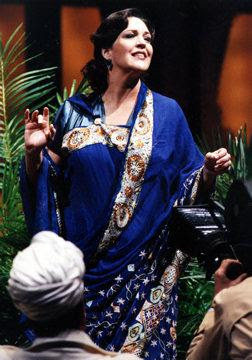Thaïs. Concert performance. June 2007. Royal Opera, London. Cast: Renée Fleming (Thaïs), Simone Alberghini (Athanäel), Joseph Calleja (Nicias). Conductor: Andrew Davis.
Renée Fleming was absolutely wonderful as Thaïs in this London concert performance at the Royal Opera House, part of an European Thaïs tour.
In many ways, Renée Fleming is ideal as Thaïs. Her floating singing style, relying rather heavily on portamento, combined with excellent acting and a captivating stage presence made for a very convincing performance. On other occasions I have had the impression that she holds somewhat back vocally, but not on this occasion where she seemed to be using her full voice throughout. Renée Fleming was, by the way, dressed in a beautiful long red silk dress with shawl for the first and second act, changing into a light brown very simple long dress for the last act.
Simone Alberghini was Athanäel, stepping in for an indisposed Thomas Hampson. Under the circumstances he performed well, without being able to generate real interest for his character, though. Joseph Calleja deservedly received massive applause as he was in excellent voice as Nicias.
The day before the performance I received an e-mail informing of Thomas Hampson´s cancellation. Good service. But I find it strange that you are required to be at the Opera House a minimum of 30 minutes before the performance (due to extra security measures) and then you have to wait outside the auditorium until 5 minutes before curtain-up cramped together in the foyer.

















